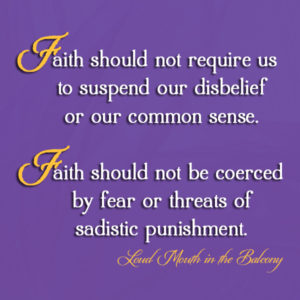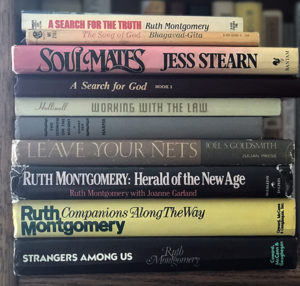Are your beliefs really yours? Did you form them independently, after serious thought or did you accept them from someone else?
Most of us are not comfortable questioning our beliefs. Some of us are even fearful of considering it. That is understandable. After all, we have been threatened that God will punish us with sadistic, unending pain unless we believe as others have instructed us.
 We also have been told to believe that God is Love. But is that how Love behaves? Does Love threaten to brutalize the beloved? Is Love to be feared? Does fear give us peace? When we are in dire need, do we instantly turn to someone we fear, someone who is full of wrath? Do we trust someone known to be violent and, on occasion, genocidal? Is that behavior divine or demonic? And why do we worship someone who behaves that way?
We also have been told to believe that God is Love. But is that how Love behaves? Does Love threaten to brutalize the beloved? Is Love to be feared? Does fear give us peace? When we are in dire need, do we instantly turn to someone we fear, someone who is full of wrath? Do we trust someone known to be violent and, on occasion, genocidal? Is that behavior divine or demonic? And why do we worship someone who behaves that way?
An educated mind entertains a thought without accepting it. ~Aristotle
If we were not being threatened with severe harm, would we willingly worship a god who acts like a demon? If we had the freedom to choose, would we prefer a close, trusting relationship with a god who loves us unconditionally; a god who does not possess the same characteristics as the most vile humans on the planet; a god who does not hypocritically tell us to forgive 70 times 7, then refuses to forgive unless an innocent son is brutally tortured to death?
How can we find that god? Perhaps a spiritual teacher can lead us. Or maybe we can become our own teacher. We have as much God within us as the world’s most revered spiritual masters. The only real difference is their relentless search for Truth. That is what led them to mastery.
 One way to search for Truth is to read more than one book. I reached this conclusion after finding a small collection of metaphysical books in a new apartment (my 19th home). Since I don’t believe there are any accidents in the Universe, I have concluded they were left there for me.
One way to search for Truth is to read more than one book. I reached this conclusion after finding a small collection of metaphysical books in a new apartment (my 19th home). Since I don’t believe there are any accidents in the Universe, I have concluded they were left there for me.
Over the years, that stack of books formed the foundation of an extensive collection of books on religion and spirituality. My collection will continue to grow because I am a lifelong learner, and I want to continue to grow. I have written questions in the margins of some of the books because I spotted inconsistencies or illogical proclamations charading as facts.
Like everyone on a spiritual quest, I question everything. I have but one goal: to seek truth and find God within it. That requires being open, objective, discerning and curious. I cannot bring any preconceived notions to a text or filter it through the jaundiced eye of preexisting beliefs. In other words, I do not assume everything I read is true. I demand the text prove itself true or provide citations so I can verify its claims. I suggest you do the same.
Spiritual truth is not mysterious. It is not complicated. If something doesn’t make sense, it probably is not true. Take what makes sense to you; discard anything else from consideration.
If you want a deeper understanding of what God is and what God does, and you want a relationship that is not based on fear of harm but on unconditional love, you can have that. Be your own spiritual teacher.
If you do not know where to begin, I have created a list from the delightfully diverse collection of reading material that has informed my beliefs.
Download the list here, and enjoy reading yourself wiser!
If you would like to recommend a book that is not on this list, please share it in the comments section.

